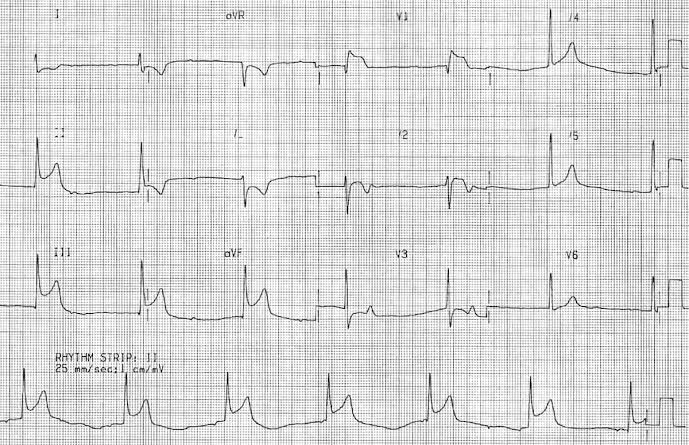
Inferior Wall Myocardial Infarction (MI), often referred to as a heart attack, is a critical medical condition that requires prompt recognition, diagnosis, and treatment. This article provides an in-depth understanding of the causes, symptoms, risk factors, diagnosis, treatment options, management protocols, and prognosis associated with Inferior Wall MI.
Introduction:
Inferior Wall MI occurs when the blood supply to the posterior part of the heart muscle is severely compromised or completely blocked. This usually transpires due to the occlusion of a coronary artery, and it can lead to a range of life-threatening complications if not managed appropriately.
Causes:
The primary cause of Inferior Wall MI is atherosclerosis, the buildup of plaque in the coronary arteries. This restricts blood flow to the heart muscle, leading to ischemia and, if left untreated, myocardial infarction.
ECG Changes in INFERIOR WALL Myocardial Infarction:
The electrocardiogram (ECG) is an essential tool in diagnosing Inferior Wall MI. Key ECG changes include:
- ST-Segment Elevation: Most characteristic ECG finding, typically in leads II, III, and aVF.
- T-wave inversion: May occur post-MI as a sign of myocardial injury.
- Pathological Q-waves: Develop if myocardial necrosis occurs.
Identifying the Culprit Artery:
Inferior Wall MI often results from occlusion of the Right Coronary Artery (RCA) or the Posterior Descending Artery (PDA). Identifying the culprit artery on the ECG can be critical. Leads II, III, and aVF reflect the RCA territory, while reciprocal changes may appear in the anterior wall leads (I, aVL, V1-V3). ECG
Symptoms of Inferior Wall Myocardial Infarction:
Common symptoms include:
- Chest pain or pressure.
- Radiating pain to the right arm or jaw.
- Shortness of breath.
- Sweating.
- Nausea or vomiting.
- Anxiety or a feeling of impending doom.
Risk Factors :
Various risk factors predispose individuals to Inferior Wall MI, including:
- Smoking: A leading cause of atherosclerosis.
- Hypertension: Increases strain on the heart.
- Diabetes: Impairs blood vessel function.
- High Cholesterol: Promotes plaque formation.
- Family History: Genetic factors play a role.
- Obesity: Increases the workload on the heart.
Treatment Of Inferior Wall Myocardial Inforction:
- Medications: Antiplatelet drugs, such as aspirin and clopidogrel, reduce clot formation. Beta-blockers and ACE inhibitors help manage blood pressure and reduce the workload on the heart.
- Percutaneous Coronary Intervention (PCI): A catheter-based procedure to open the blocked artery with stent placement.
- Coronary Artery Bypass Grafting (CABG): Surgical revascularization if multiple vessels are involved.
Management Protocol for Inferior Wall MI:
A comprehensive protocol involves immediate recognition, ECG confirmation, and rapid intervention. PCI is often preferred if it can be performed within the appropriate time frame, while CABG may be considered in complex cases.
Prognosis:
Early diagnosis and intervention significantly impact prognosis. Prompt treatment can prevent further damage and improve long-term outcomes. However, individual outcomes can vary based on the extent of damage and underlying health.
Secondary Drug Prophylaxis:
Long-term management involves medications like antiplatelets (aspirin, clopidogrel), beta-blockers (metoprolol), ACE inhibitors (lisinopril), and statins (atorvastatin) to manage risk factors and prevent future events.
Lifestyle Changes:
Patients must embrace heart-healthy habits, including:
- Smoking cessation.
- Regular exercise.
- Healthy diet low in saturated fats and cholesterol.
- Blood pressure and blood sugar control.
In conclusion, Inferior Wall MI is a critical cardiovascular condition that demands immediate attention. Timely diagnosis, appropriate treatment, and diligent long-term management are essential for the best possible outcomes and improved quality of life. It is crucial to work closely with healthcare professionals to address this condition effectively and adopt a heart-healthy lifestyle for long-term well-being.
Great article